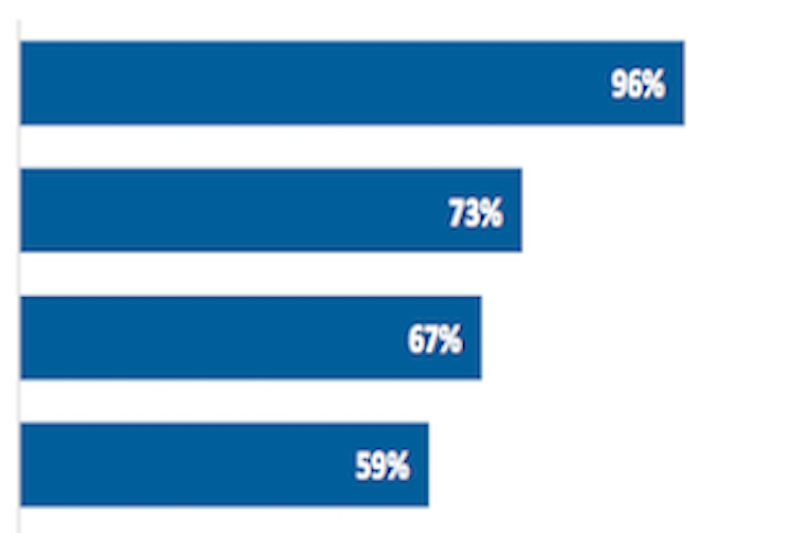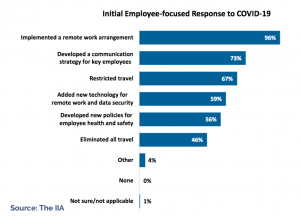
A new survey of internal audit leaders finds that they are focusing their coronavirus response on assessing the short-term impact of the pandemic (78 percent) and communicating with the board (72 percent).
When asked for their initial strategic response to the COVID-19 crisis, chief audit executives and audit directors also said they are working on revising business continuity plans (66 percent) and evaluating the impact of the pandemic on third-party relationships (59 percent).
The survey, conducted by the Audit Executive Center of the Institute of Internal Auditors, polled 170 chief audit executives (CAEs) and audit directors in the United States and Canada for their responses and views on how internal audit has reacted to the COVID-19 crisis that has massively disrupted commerce around the globe.
Read also, “All Hands on Deck.”
It also found that companies are prioritizing employees over customers in their crisis decision making, with 46 percent of internal audit leaders saying employees are the first priority and 22 percent putting customers first. Another 19 percent put lenders or shareholders first in their considerations of the organization’s response to COVID-19. Most (96 percent) say they have initiated work-from-home arrangements for employees.
Internal Audit Getting Involved?
While most respondents reported that they are now involved in their organizations’ responses to the coronavirus, 37 percent said they should have been brought in sooner to discuss the risks and potential responses. Only slightly more, 43 percent, said they were included in discussions in a timely manner.
 The coronavirus poll also finds that internal audit leaders at bigger companies are more involved in their organization’s response to coronavirus than those at smaller companies. At companies with an internal audit department of 26 or more professionals, 62 percent say their organizations involved internal audit in discussions of risk and potential responses to the crisis. At companies with internal audit departments of five or less professionals, only a third (32 percent) say the organization included internal audit in such discussions in a timely manner.
The coronavirus poll also finds that internal audit leaders at bigger companies are more involved in their organization’s response to coronavirus than those at smaller companies. At companies with an internal audit department of 26 or more professionals, 62 percent say their organizations involved internal audit in discussions of risk and potential responses to the crisis. At companies with internal audit departments of five or less professionals, only a third (32 percent) say the organization included internal audit in such discussions in a timely manner.
“While findings about the timeliness of internal audit’s involvement are concerning, the poll also provides data that suggests there are opportunities for internal audit to provide ongoing support through insight and foresight,” wrote IIA President Richard Chambers in a related blog post. “For example, only about half of respondents (51 percent) reported their organizations had performed a detailed assessment of long-term impact, and less than half (45 percent) reported a review of strategic plans with management. Those two areas will be significant as organizations around the world manage the ongoing risks related to COVID-19 and economic turmoil,” he wrote.
Sufficient Resources?
The coronavirus poll did provide some generally good news about how companies are responding to the crisis. About 75 percent of the internal audit leader respondents said their organizations have sufficient resources available to respond to COVID-19. Only 6 percent were concerned that their companies may not have sufficient resources to respond, and another 7 percent said they didn’t know.
Chief audit executives were also fairly confident in the effectiveness of their companies’ corporate governance structures during the crisis. About 80 percent said they were satisfied that corporate governance is operating effectively related to COVID-19. ![]()
Joseph McCafferty is editor & publisher of Internal Audit 360°

